
 Agiassos
Agiassos
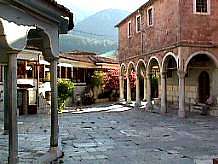 According to Andrea and Let's Go Greece, This is the second most holy place in Greece, (next to the church in Tinos where people crawl on their hands and knees up the steps to the holy icon of the Panagia). On the first of August the pilgrims begin to arrive here, camping on the road that leads to the large church in the center of town. By the fifteenth of the month, the Holy-day of the Virgin Mary, the place is a madhouse. Today is only the sixth and driving through the tiny steeply-inclined streets, already full of people, is horrifying. The first miracle of the season is that I don't run over anyone. The roads are narrow and at such a sharp incline that I have to keep a delicate balance bewteen the break and the gas since I must stop frequently for pedestrians. We park the car at the top of the village where Andrea's cousins Sophia and Anna live with their Grandmother Sophia. They are ecstatic to see us and especially happy to see Amarandi with whom they play for hours until they become exhausted and leave
her with us. We have a wonderful lunch of the largest pink snapper I had ever seen.
According to Andrea and Let's Go Greece, This is the second most holy place in Greece, (next to the church in Tinos where people crawl on their hands and knees up the steps to the holy icon of the Panagia). On the first of August the pilgrims begin to arrive here, camping on the road that leads to the large church in the center of town. By the fifteenth of the month, the Holy-day of the Virgin Mary, the place is a madhouse. Today is only the sixth and driving through the tiny steeply-inclined streets, already full of people, is horrifying. The first miracle of the season is that I don't run over anyone. The roads are narrow and at such a sharp incline that I have to keep a delicate balance bewteen the break and the gas since I must stop frequently for pedestrians. We park the car at the top of the village where Andrea's cousins Sophia and Anna live with their Grandmother Sophia. They are ecstatic to see us and especially happy to see Amarandi with whom they play for hours until they become exhausted and leave
her with us. We have a wonderful lunch of the largest pink snapper I had ever seen.
Andrea's cousin Yacovah is the Bishop of Mytilini and he is in town for the festivities. This spring he had gone to Serbia and brought fifty children here to escape the war for six months. They became very attached to the village and the villagers to them, and did not want to go back to their war torn country. The final evening together everybody was crying knowing that they were returning to a tragedy. What a sad moment it must have been when they all left and the villagers realized that these innocent children were going back to the war. Soon some of them would be fighting. Others would lose parents, brothers and sisters or become victims themselves.
"War is a catastrophe," grandmother Sophia says "Nobody ever really wins."
If I were to write only at night this would be a totally different story. Here I've been ragging on this poor defenseless island making it sound like hell on earth when really it's just like anywhere else in Greece during the long hot summer. If you can just make it through the day, the night will be OK. Or better.
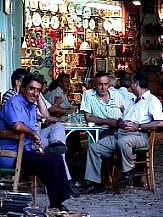 Tonight for example. Andrea and I put Amarandi in her stroller and walk down the cobblestone streets to the main square of the village. Amarandi is asleep within five minutes and misses out on all the entertainment. This is the second to last Sunday before the panagiri, whatever significance that has, and the town is jumping. The cafeneons are crammed full of old men. Around the church are numerous shops and stalls selling everything from religious icons to ouzo and sardines. Inside the church complex are dozens of old women who walk up and kiss the hand of Andrea's cousin the bishop and the holy miracle working icon, which has seen better days and is nearly unrecognizable. There is also the skull of a Saint Theodore who was massacred by the Turks two hundred years ago and is now getting his share of kisses by the old ladies and pilgrims. Even Andrea gives him a little peck on the forehead. There seem to be a few ladies around who I might describe as hookers, maybe seeking redemption or perhaps easy prey. We
wander around the courtyard of the large church where people are camped out in homemade tents that look quite luxurious and inviting. There is also a hostel where people can stay, with balconies full of old women calling out to their friends and neigbors. The streets outside the church are packed. There are more stores, selling ceramics, plastic toys, and everything else you can imagine. We stop and sit in the small shop of Yannis Kamouris, Greece's most renown santouri player who serenades us with several different styles of music. We buy a tape from him and continue walking to the bottom of the hill where pilgrims are arriving by the busload.
Tonight for example. Andrea and I put Amarandi in her stroller and walk down the cobblestone streets to the main square of the village. Amarandi is asleep within five minutes and misses out on all the entertainment. This is the second to last Sunday before the panagiri, whatever significance that has, and the town is jumping. The cafeneons are crammed full of old men. Around the church are numerous shops and stalls selling everything from religious icons to ouzo and sardines. Inside the church complex are dozens of old women who walk up and kiss the hand of Andrea's cousin the bishop and the holy miracle working icon, which has seen better days and is nearly unrecognizable. There is also the skull of a Saint Theodore who was massacred by the Turks two hundred years ago and is now getting his share of kisses by the old ladies and pilgrims. Even Andrea gives him a little peck on the forehead. There seem to be a few ladies around who I might describe as hookers, maybe seeking redemption or perhaps easy prey. We
wander around the courtyard of the large church where people are camped out in homemade tents that look quite luxurious and inviting. There is also a hostel where people can stay, with balconies full of old women calling out to their friends and neigbors. The streets outside the church are packed. There are more stores, selling ceramics, plastic toys, and everything else you can imagine. We stop and sit in the small shop of Yannis Kamouris, Greece's most renown santouri player who serenades us with several different styles of music. We buy a tape from him and continue walking to the bottom of the hill where pilgrims are arriving by the busload.
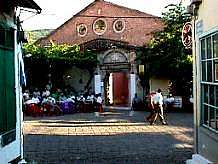 We turn around and start up the hill ready to begin the night of ouzo and entertainment. We walk past the tourist restaurants that advertise their fare in big English letters, to the settlement of cafeneons around the famous church. We find the least crowded and take a seat on the street. I order some fried sardines and some ouzo and we begin the night's festivities. It is as traditional a place as you could imagine. No menu. Just Ouzo, beer, restsina and whatever the proprietor happens to be making to eat that evening. While we are going through our first bottle of ouzo I see a retarded fellow drop a pile of fish on the next table. I follow him down the hill to see what the deal is. He goes into a store where a man is selling sardines out of a pail.
They were caught this morning in the bay of Kaloni and then left in salt for several hours.
We turn around and start up the hill ready to begin the night of ouzo and entertainment. We walk past the tourist restaurants that advertise their fare in big English letters, to the settlement of cafeneons around the famous church. We find the least crowded and take a seat on the street. I order some fried sardines and some ouzo and we begin the night's festivities. It is as traditional a place as you could imagine. No menu. Just Ouzo, beer, restsina and whatever the proprietor happens to be making to eat that evening. While we are going through our first bottle of ouzo I see a retarded fellow drop a pile of fish on the next table. I follow him down the hill to see what the deal is. He goes into a store where a man is selling sardines out of a pail.
They were caught this morning in the bay of Kaloni and then left in salt for several hours.
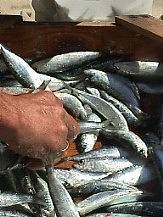 I buy a handful for two hundred drachs and bring them back to Andrea to her un-delight. These are the famous sardeles pastes. I eat the first one, skin bones and all and realize I either have a lot to learn about sardeles pastes, or that I better find some hungry cats. I don't panic though. I walk over to the next table to see what the pros are doing with theirs since they obviously know a little more then I do. A man leaps up from another table and comes to our rescue, not only showing me how to clean them, by removing the skin and the heads, but cleaning my entire bag full. I thank him and try the first one. Delicious. Better than sushi and perfect with ouzo. Before I know it they are all gone and I'm drunk on ouzo and raw fish. I stumble back to the store where I had gotten them but the retarded guy and his boss have disappeared into the night. When I return to Andrea we are given a plate of stewed crab by the old men at the next table. I return the favor, buying them a bottle of ouzo. By the time we leav
e we were all good friends.
I buy a handful for two hundred drachs and bring them back to Andrea to her un-delight. These are the famous sardeles pastes. I eat the first one, skin bones and all and realize I either have a lot to learn about sardeles pastes, or that I better find some hungry cats. I don't panic though. I walk over to the next table to see what the pros are doing with theirs since they obviously know a little more then I do. A man leaps up from another table and comes to our rescue, not only showing me how to clean them, by removing the skin and the heads, but cleaning my entire bag full. I thank him and try the first one. Delicious. Better than sushi and perfect with ouzo. Before I know it they are all gone and I'm drunk on ouzo and raw fish. I stumble back to the store where I had gotten them but the retarded guy and his boss have disappeared into the night. When I return to Andrea we are given a plate of stewed crab by the old men at the next table. I return the favor, buying them a bottle of ouzo. By the time we leav
e we were all good friends.
Amarandi wakes up so we walk back to the church and she kisses all the icons. Then we struggle up the steep hill in the direction of home. At the halfway point we stop in to see some cousins of Andrea's. Of all things, they are watching a documentary of the man we called Samson, the traveling strongman. He was really called Hercules but his real name was Jimmy Armaias. He is a cult hero, especially with the Athenian nautilus crowd. In the program there is an interview with him as an old man, films of him when he was a little younger and photos of him in his prime. The most famous was of him with a truck on his chest. We see him do the sword trick where he accidentally gets cut and dabs himself with mercurochrome. The sad part is the fact that he had recently died a pauper. He had been exploited by people who took him to Australia and America, paying him virtually nothing. The last scene is his tiny gravestone in some crummy cemetery in the middle of nowhere. I'm fascinated by the show but Andrea's cousin, afr
aid that I'm bored, keeps switching the channel to see if there is anything else on. I have to respond enthusiastically to everything the narrator says about Samson, so Andrea's uncle will get the message that I am interested in this show. He quickly realizes this and leaves it until the credits come on screen, the begins channel surfing again. Unfortunately there are very few channels to surf to.
After the show I feel so claustrophobic and stifled that I ask Andrea if we can please leave and continue the torturous journey upward. It must be a mile from the church to the top of the village and it's not until we are three quarters of the way there that I remember my walking downhill trick, which makes the trip much easier.
When we reach the house where we are staying, we find the communist father of Andrea's cousin the bishop, sitting on the steps outside. In a few moments we are joined by the bishop himself who stays out on the street talking to us for half an hour. Andrea tells him all about Amarandi's baptism at Saint Barbaras in Durham, North Carolina. When she finishes, the bishop announces that he had recently performed a service for a baby who was the first child baptized in a town that had just been taken from the Croats. I don't know if he means it the way it sounds. Is this a war to win converts? Are the Serbs emancipating Orthodox Christians from Catholic and Muslim territories? I decide not to pursue the issue. I'm sure the bishop has done more to promote world peace then I have. Who am I to question or judge?
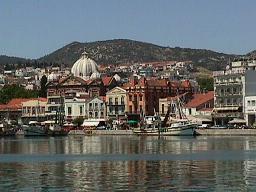 Monday August 7th
Monday August 7th
We should have gotten up and out of the house early today. We don't and we suffer for it. We have to go to Mytilini town to change money and buy our boat tickets. We arrive right after the ferry deposits about ten thousand people and nine thousand cars, here for the weekend of the fifteenth. The town is one big endless traffic jam and by the time we are finally able to park on the waterfront our nerves are shot. Andrea goes to the bank. When she walks in the place is mobbed. There are no lines, just a big crowd that spills out the door and on to the sidewalk. In the middle is a man who has fainted from the heat and stress and people pack in around him to get a closer look and use up his share of oxygen. Andrea fights her way to a counter and asks what the format is to be served. The woman tells her to take a number. It's #189. The sign says now serving #3.
I walk to the ferry boat office which is also packed. I don't even bother to get on line but study the schedule which I soon have memorized. Then I go to Just Car Rental to wait for Andrea. Mary, the owner is busy too but since she has no cars left her job is very easy. All she has to do is shake her head and say "sorry, no," to everyone who comes in. She buys me a frappe and I sit outside and watch the people passing by.
Andrea finally shows up and we sit talking to Mary about nice places to visit for our last few days. We had planned to go to Xidera today but by the time we get there it will be siesta time and we'd have to hang around waiting for everybody to wake up. Instead we decide to go to Polichnitou and Vatera, two places I haven't been to yet.
Getting out of the city turns out to be as difficult as getting in even though the arriving passengers and vehicles have already been dispersed around the island. I want to take the back road by the old port and cut through by the ancient aqueduct at Moria but Andrea says I should try to cut through the upper part of the city. This turns out to be impossible and we became hopelessly embedded in the tiny cobblestone streets that are no wider then our car. We finally escape and continue the way we had been going after wasting fifteen precious minutes of our vacation.
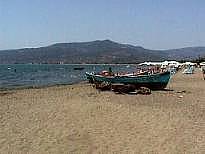 We take the road around the bay of Yeras, past Agiassos, driving through a beautiful pine forest and a fertile high plain full of corn fields. Then we pass through a huge section of olive groves. We drive through the village of Polychnitou, an industrial revolution town which had seen better days. There was a big football stadium and other signs of life, most likely of a military nature. The town of Skala Polychnitou is on the inland sea of Kaloni where the smaller, juicier sardines are caught. We find a simple restaurant on the beach and eat a delicious lunch of grilled sardines, fava beans, fried peppers, salad, sadziki and beer. It costs next to nothing. As usual Amarandi has fallen asleep and I don't want to wake her to eat, knowing how when we do it usually backfires on us and we wish we'd left her sleeping.
We take the road around the bay of Yeras, past Agiassos, driving through a beautiful pine forest and a fertile high plain full of corn fields. Then we pass through a huge section of olive groves. We drive through the village of Polychnitou, an industrial revolution town which had seen better days. There was a big football stadium and other signs of life, most likely of a military nature. The town of Skala Polychnitou is on the inland sea of Kaloni where the smaller, juicier sardines are caught. We find a simple restaurant on the beach and eat a delicious lunch of grilled sardines, fava beans, fried peppers, salad, sadziki and beer. It costs next to nothing. As usual Amarandi has fallen asleep and I don't want to wake her to eat, knowing how when we do it usually backfires on us and we wish we'd left her sleeping.
We want to go for a swim but there is something creepy about the sea of Kaloni. I don't mind eating the sardines that swim, eat and breed in there but when it comes to letting that water touch my skin I have to draw the line. It's an enormous enclosed sea, several miles wide. The opening is a bottleneck like Gibraltar. Lesvos has two of these seas. The other one is the sea of Yeros which until a few years ago was very polluted by a an old tanning factory. My theory is that anything dumped in these seas is still there. How could it leave? It's the same thing the environmentalists say about the Mediterranean. These are closed seas within a closed sea. How clean can they be? So despite the beauty of it, we get in the car and drove to Vatera, a seven mile sandy beach that faces the open Agean.
VATERA
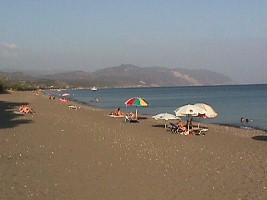 Vatera is a Greek-tourist spot, which is evident when we arrive during siesta time and there is nobody on the beach. Instead of taking advantage of the empty beach we continue down the dirt road and over a wooden bridge through a marshy area to another smaller beach on the tip of a peninsula. This is where Andrea had come with Stewart, her archeologist boyfriend ten years ago. It's what I call a skuzharbor. These are tiny harbors made up of landfill. They look like dump trucks just kept backing up and dumping rubble until they had made a sheltered area for the fishing boats. Because it is so ugly, the fishermen don't feel obligated to keep it clean and just carelessly throw all their garbage into the water where it catches in the rocks and stays there for years or however long it takes plastic to decompose. Sigri is a skuzharbor. So are the harbors of Skala Sikaminias, Gavatha, Erressos, and Skala Thermis. So is much of Mytilini harbor. I suppose they biuld them when there are no natural harbors. It doesn't m
atter. When I see a skuzharbor it's bad news. It makes me not want to swim anywhere near it no matter how clean the surrounding sea looks. Agia Fotia, where we are now, is no exception. Even though I can find no plastic or other evidence of a polluted sea to back up my fears, I can't get over the fact that I as swimming so close to a skuzharbor and I'm not comfortable. I swim a couple hundred yards in the opposite direction but I can feel it looming behind me. I turn back and leave the water for the safety of the garbage strewn seashore.
Vatera is a Greek-tourist spot, which is evident when we arrive during siesta time and there is nobody on the beach. Instead of taking advantage of the empty beach we continue down the dirt road and over a wooden bridge through a marshy area to another smaller beach on the tip of a peninsula. This is where Andrea had come with Stewart, her archeologist boyfriend ten years ago. It's what I call a skuzharbor. These are tiny harbors made up of landfill. They look like dump trucks just kept backing up and dumping rubble until they had made a sheltered area for the fishing boats. Because it is so ugly, the fishermen don't feel obligated to keep it clean and just carelessly throw all their garbage into the water where it catches in the rocks and stays there for years or however long it takes plastic to decompose. Sigri is a skuzharbor. So are the harbors of Skala Sikaminias, Gavatha, Erressos, and Skala Thermis. So is much of Mytilini harbor. I suppose they biuld them when there are no natural harbors. It doesn't m
atter. When I see a skuzharbor it's bad news. It makes me not want to swim anywhere near it no matter how clean the surrounding sea looks. Agia Fotia, where we are now, is no exception. Even though I can find no plastic or other evidence of a polluted sea to back up my fears, I can't get over the fact that I as swimming so close to a skuzharbor and I'm not comfortable. I swim a couple hundred yards in the opposite direction but I can feel it looming behind me. I turn back and leave the water for the safety of the garbage strewn seashore.
By now Amarandi is hungry so Andrea takes her to the less pretentious of the two remote tavernas, the one without the fancy wine list. By the time I arrive she has already ordered fried potatoes which Amarandi eats, and sardines which we feed to the dog and cat. After we down a couple Turkish coffees we walk up to the tiny church of Agios Fokas which is next to the ruins of an ancient temple of Dionysious. There is not much left of the temple. Just a couple broken columns and some of the foundation. But they have put a cyclone fence topped with barbed-wire to keep out anyone who wants to steal those remaining pieces. It seems silly. Anyone who wants to go through the trouble of stealing a two ton marble column could easily have a pair of wire cutters in his truck.
We don't intentionally decide to take an alternate route home to Agiassos, but after following the beach of Vatera it's entire length, we are reluctant to turn back. The road and the beach go on forever. It has to be the longest beach in Greece. I don't know the condition of the other road to Agiassos but I am more willing to take a chance on it then I am to back-track.
The first leg of the journey is a dirt road that winds through the valleys heading inland. After passing through a tiny village called Kato Stavros that has a giant old olive oil pressing factory, the road continues upward, going back and forth until it reaches the top of a mountain. Then it circles down again through the tiny village of Embelikipos, which looks almost uninhabited. From that point on the road is bad. It isn't because it's like the previous part of the trip, a roughly cut road through rock, worn down by a half century of wagons, donkeys and pickup trucks. It's because somebody had decided that this tiny little village was in need of a super-highway connecting it to the rest of the island. I can picture the chain of events leading to the construction of this new road. A contractor bribes a local politician who allocates the money in the name of road improvement, probably from some EEC funds. They build this giant superhighway that leads nowhere and everybody is happy. The heavy machines had cut
a swath through the pine forested mountains twenty miles long and fifty yards wide. They had dynamited entire portions of the mountain and were in the process of laying gravel as a preliminary to putting down the asphalt. It's a rough trip for our poor rental car and we have to go very slowly but we are way past the point of turning back. Eventually we reach the part where they had actually put down the pavement and we happily race home, the wind blowing the dust out of our hair.
Tuesday August 8th
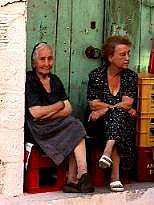 I'm sitting in the highest cafeneon in the village of Agiassou under five large pine trees that Andrea's grandfather planted fifty years ago. This used to be his field but they built a road through it and split a small part off. He made that part the cafeneon and the other side he built three houses for his daughters. The cafeneon is built where the road makes a hairpin turn up the mountain. On one side it is at street level. The other side is a drop of fifty feet and a steeply inclined staircase. The patio is about thirty yards long, covered by a grape arbor. It overlooks a part of the village and most of the valley between here and the Sea of Yeros. Because we are so high in the mountains the morning temperature is much cooler then below. It feels like the most beautiful North Carolina spring day.
I'm sitting in the highest cafeneon in the village of Agiassou under five large pine trees that Andrea's grandfather planted fifty years ago. This used to be his field but they built a road through it and split a small part off. He made that part the cafeneon and the other side he built three houses for his daughters. The cafeneon is built where the road makes a hairpin turn up the mountain. On one side it is at street level. The other side is a drop of fifty feet and a steeply inclined staircase. The patio is about thirty yards long, covered by a grape arbor. It overlooks a part of the village and most of the valley between here and the Sea of Yeros. Because we are so high in the mountains the morning temperature is much cooler then below. It feels like the most beautiful North Carolina spring day.
Agiasou is my new favorite village in Greece. It's more of a city really, built between the peaks of two mountains and rising up the sides of both. The architecture is completely traditional. It's difficult to find any building in bad taste. The approach to the town is lined with restaurants for the pilgrims coming for the celebration of the Virgin Mary at the large church that holds the central position in the village. Around it are the cafeneons and that is where the real life is. Always full of men and friendly conversation they serve a collection of interesting snacks to go with the local ouzo that
everybody drinks. Everyone is very friendly because they have not been besieged by the Euro-tourists whose paradise is the beaches and resorts that dot the rocky coast.
For me Agiassou is a revelation. Life on Lesvos is in the mountain villages. While towns like Erressos and Molivos rake in the pounds, marks and dollars, destroying themselves in the process, the mountain villages have thrived in a sensible way and have retained the charm and lifestyle that they have had for hundreds of years, or more.
Andrea's aunt Sophia's house is at the top of the village. Beyond it is a famous old sanitarium on the old dirt road to Plomari, impassable in anything but a four-wheel-drive vehicle or a rental car. The cafeneons are at the center of the village halfway down. It's an enjoyable trip getting there but coming back is hell, especially with a belly full of raw sardines, a head full of ouzo and pushing a baby stroller with a child who grows heavier with each step.
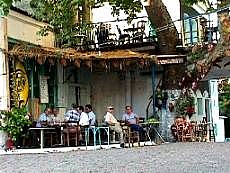 Last night Andrea introduced me to the cafeneons of the upper village and what I saw as the only imperfection of life here has been eliminated. It made sense to me that not everybody would want to walk up and down a mountain everytime they wanted a drink. These four old cafeneons addressed that problem. The food was just as delicious and the people as friendly as below. They are just less labor intensive. Last night for the first time I had Kolios Pastes which is raw mackerel rather then sardines. It was delicious. I could have eaten two or three orders but Aunt Sophia was making a feast for us back at the house so we had to control ourselves. Amarandi was also being impossible and we only shared one bottle of ouzo before walking back to the house where we ate stuffed eggplant, fried squid, tomato salad and home made feta cheese.
Last night Andrea introduced me to the cafeneons of the upper village and what I saw as the only imperfection of life here has been eliminated. It made sense to me that not everybody would want to walk up and down a mountain everytime they wanted a drink. These four old cafeneons addressed that problem. The food was just as delicious and the people as friendly as below. They are just less labor intensive. Last night for the first time I had Kolios Pastes which is raw mackerel rather then sardines. It was delicious. I could have eaten two or three orders but Aunt Sophia was making a feast for us back at the house so we had to control ourselves. Amarandi was also being impossible and we only shared one bottle of ouzo before walking back to the house where we ate stuffed eggplant, fried squid, tomato salad and home made feta cheese.
After dinner we watched a little television. Mega-Channel was showing "The Two Jakes", but it started at 11:45. The problem with watching movies on TV in Greece at night is that no matter what is going on in the film, at precisely twelve midnight they cut to a half hour of news. Every channel does this. I suppose it's to have a captive audience. It's more like a hostage situation. Then after the weather report (which is always the same, sunny and hot,) back comes the film, sometimes in mid-sentence or action. Except by then usually I'm not interested anymore and after about five minutes of trying to remember the plot I give up and go to bed.
XIDERA
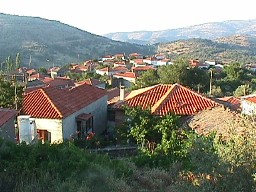 The drive to Xidera takes about an hour and a half. Amarandi is difficult for much of it but we either become immune or she starts behaving, I don't know which. We park in the platia and walk to cousin Mitzo's house. He has been wondering what had happened to us. He had heard we were on the island and was beginning to think we had left without saying hello or good-bye. As soon as we sit down in the tiny kitchen, his wife Anna brings in three plates of candied cherries. Then she sets up a little table and feed us omelets, green beans and a tomato salad which features the Anaheim peppers that I had given Mitzo the seeds for two years ago. They are hot but different from Anaheim's grown in America. I wonder why. After dinner he breaks out his special home made ouzo called tsipuro which is delicious and potent. It tastes like southern moonshine. I have to turn down the next glass so I will be able to drive. I escape but on the way out I run into Andrea's cousin Panayotis drinking ouzo and eating sardelis pastes o
utside his cafeneon. I can't resist either and we sit and talk for an hour while Andrea is inside speaking with his wife Aglaia. They show us how to make pastes from fresh fish and give us some information on the best anchovies and ouzos. When we leave they present us with a bottle of Tsikali brand ouzo and some home-made trachana, which are sour wafers made of wheat and then dried.
The drive to Xidera takes about an hour and a half. Amarandi is difficult for much of it but we either become immune or she starts behaving, I don't know which. We park in the platia and walk to cousin Mitzo's house. He has been wondering what had happened to us. He had heard we were on the island and was beginning to think we had left without saying hello or good-bye. As soon as we sit down in the tiny kitchen, his wife Anna brings in three plates of candied cherries. Then she sets up a little table and feed us omelets, green beans and a tomato salad which features the Anaheim peppers that I had given Mitzo the seeds for two years ago. They are hot but different from Anaheim's grown in America. I wonder why. After dinner he breaks out his special home made ouzo called tsipuro which is delicious and potent. It tastes like southern moonshine. I have to turn down the next glass so I will be able to drive. I escape but on the way out I run into Andrea's cousin Panayotis drinking ouzo and eating sardelis pastes o
utside his cafeneon. I can't resist either and we sit and talk for an hour while Andrea is inside speaking with his wife Aglaia. They show us how to make pastes from fresh fish and give us some information on the best anchovies and ouzos. When we leave they present us with a bottle of Tsikali brand ouzo and some home-made trachana, which are sour wafers made of wheat and then dried.
Amarandi falls asleep on the way home and doesn't wake up until we have stopped for coffee at a tree shaded taverna next to a mountain spring. The spring itself is amazing. They have built a round cement pond to contain the water which flows so abundantly that it gushes down the mountain in a deep stream. As we stand with our feet in it to cool off, the water is so cold it almost gives me a headache. I wonder about this island that has both cold and boiling hot water gushing from the earth. There is an abundance of natural treasures here. I feel bad for criticizing the island out of my own ignorance of it's hidden beauty. Now it's one of the greatest places on earth as far as I'm concerned.
We make an incredible discovery today. We don't have to drive down the hill through the village, or up for that matter. It had been my own special hell negotiating the narrow streets full of tourists and pilgrims, that are at such an incline that one faulty foot movement could cause the car to stall. Re-starting requires deft hand and foot coordination between the brake pedal, the clutch, the gas and the hand brake. Now we have found the secret back entrance to the village that goes past the football stadium and what might be called the industrial zone. It connects with the main road outside the village. We had seen the road before but assumed it went to some monastery. Now we can come and go without the accompanying terror.
I love Andrea's cousins Anna and Sophia. Their mother died ten tears ago. Their father is in the merchant marines and travels continuously so they have been left with their grandmother Sophia who is very religious. The two girls are not what you would call "wild" but they are hip and know what is going on. Sophia is nineteen and lives in Athens. Anna is around seventeen and still lives here in Agiassos. They tell me a saying that the men in Mytilini have.
"Stin Agiassou e Plomari oute genneka oute moulari"
"From Agiassou or Plomari neither wife not mule."
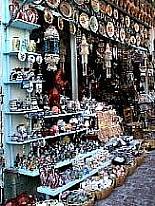 They think it's funny because their mother is from Agiassos and their father is from Plomari. Sophia has made a pact with the Virgin Mary to wear black for fifteen days every year. In return the virgin will help her pass her exams. I ask her if I wore black would the Virgin go to work for me so I can stay home and read. They think it's a funny idea. I'm glad they aren't offended. They are both beautiful. Sophia is especially sexy, both innocent and provocative in her dress and mannerisms. Plus they speak English in the most endearing style possible.
They think it's funny because their mother is from Agiassos and their father is from Plomari. Sophia has made a pact with the Virgin Mary to wear black for fifteen days every year. In return the virgin will help her pass her exams. I ask her if I wore black would the Virgin go to work for me so I can stay home and read. They think it's a funny idea. I'm glad they aren't offended. They are both beautiful. Sophia is especially sexy, both innocent and provocative in her dress and mannerisms. Plus they speak English in the most endearing style possible.
Tonight they go to the church. Andrea arranges to meet them after the ceremony and while she and Amarandi watch the service I wander around looking at different brands of ouzo and canned fish. According to the store owner all the ouzo is good. It just depends on your taste. But the ouzo from Plomari is much stronger. That would explain why they say all the people from there are crazy. I feel a certain madness has set in in my own consciousness, or semi-consciousness, and I've been drinking the regular Mytilini stuff. Following the man's advice I buy three bottles of ouzo Veto which seems to be the favorite of many people, Andrea and her uncle Panayotis included. I also buy several tins of sardines, mackerel, and anchovies, in the blue cans, as I was told to by Andrea's aunt in Xidera. We walk back up the mountain with Andrea pushing Amarandi in the stroller and me carrying twenty pounds of ouzo and canned fish. We go back to the cafeneons in the upper village and sit where we had eaten last night. Tonight the
y are featuring sardeles pastes, just like I had eaten with Andrea's uncle Panayotis at lunch. We also have the best fried potatoes of the summer, even better then Thea Katina's and the worlds best fried squid. We drink two bottles of ouzo while Amarandi plays with the local cats and Andrea tells me the story of how she first came to Xidera as a teenager in the nineteen-sixties. To her it was like being sentenced to a term in Siberia and she and her cousin sat in the room they had been given, listening to tapes of the Rolling Stones and corrupting her three year old cousin (who grew up to be the woman who dropped us off in the middle of nowhere that time Andrea was pregnant.)
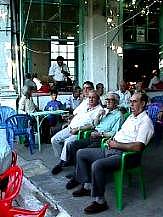 The cafeneon owner is a great host and each dish is better then the last. The people of Mytilini have perfected the art of drinking and eating. If someone gave me a plate of sardines, pastes style, I would probably throw-up. Yet when served with ouzo they are perfect. Sometimes I think about them when I am driving or laying in bed. They are the Greek equivalent of Sushi and either you love them or hate them. They're considered something special here. None of the cafeneons serve them every night. It's a matter of luck if the place you sit down in offers them. To go from cafe to cafe asking if they have them is in bad taste as I realized when I did it tonight at the cafeneons down below. The old men are probably still talking about me.
The cafeneon owner is a great host and each dish is better then the last. The people of Mytilini have perfected the art of drinking and eating. If someone gave me a plate of sardines, pastes style, I would probably throw-up. Yet when served with ouzo they are perfect. Sometimes I think about them when I am driving or laying in bed. They are the Greek equivalent of Sushi and either you love them or hate them. They're considered something special here. None of the cafeneons serve them every night. It's a matter of luck if the place you sit down in offers them. To go from cafe to cafe asking if they have them is in bad taste as I realized when I did it tonight at the cafeneons down below. The old men are probably still talking about me.
We pay and leave. Of course it was amazingly cheap. The good thing is we don't have to walk all the way up the mountain which we would have had to if we had eaten below. We also discover that the delicious mackerel we had eaten there last night were the same ones they sell in the can. The blue can of course.
So just as I started the day in the cafeneon that Andrea's grandfather built, high in the upper village, I now end it. The wind is blowing and I can't remember ever feeling a climate more comfortable. My only complaint is about the Agiassos teenagers riding by on their super loud motorbikes, doing wheelies down the hill to impress the girls hanging out here who are not the least bit interested. Tomorrow begins a new phase in the journey, the beginning of the end. We have to be in Mytilini town by two to return our beloved car. Then we'll hang out until six when our ship leaves for Pireaus. If everything goes right we will get to Pireaus at least an hour before the flying dolphin we plan to take to Kea leaves. If not, we have to take a train to Platia Victoria, a bus to Lavrion and then hopefully the ferry to Kea. The only thing I'm looking forward to is the first class cabin on the Mytilini, voted the #1 ferry in the Aegean in 1994 by Ethoplistis magazine. The rest of the trip I will try to make the best of,
no matter what happens.
August 9th
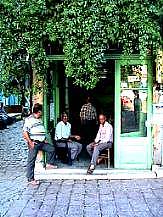 I wake up to the sound of the dekaoctades. These are doves who chant the number eighteen, deka-octo, thus the name. I don't know if everybody calls them that, but Andrea does. It's very early when I go outside and walk next door to the little church that Aunt Sophia takes care of. I know it's her because like her own roof and terraces, every available inch of space is covered with well cared for potted plants. Inside are several nice icons, behind glass, even though they're quite modern.
I wake up to the sound of the dekaoctades. These are doves who chant the number eighteen, deka-octo, thus the name. I don't know if everybody calls them that, but Andrea does. It's very early when I go outside and walk next door to the little church that Aunt Sophia takes care of. I know it's her because like her own roof and terraces, every available inch of space is covered with well cared for potted plants. Inside are several nice icons, behind glass, even though they're quite modern.
I come over to the Famaka, which is the name of the cafeneon across the street that Andrea's grandfather built. It used to be called the Casino until a girl moved here from another village. She wrote to her father that she was working at the Casino and he became worried. When he came here to rescue her he discovered Casino was just the name of the cafeneon. He convinced Andrea's grandfather to change the name to Famaka which is the bow of a ship, the shape the cafeneon's long shaded courtyard resembles. I'm sitting here drinking a double Turkish coffee wondering how I am ever going to re-adapt to life in America. I'm looking over an old ceramic tile roof at the mountains and hills. A little further I can see the Mediterranean and beyond that the mountains of Turkey.
Most of the village is still asleep. Roosters are crowing everywhere and I can hear the chatter of workers somewhere below. It's too bad this all has to end, as the owner of the cafe has begun to mount the gigantic speakers that in a few moments will be blaring Greek-pop from Radio Kaloni.
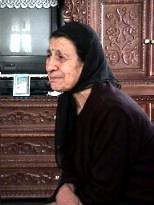 Aunt Sophia has been up since six, watering the plants. Andrea calls her a Mother Teresa type. She is always so energetic and cheerful and eager to feed us. She spends much of her time going to church, though yesterday she went out with Andrea's Uncle Yannis and picked several bags of pears before the birds could get to them. She left some fresh and stewed the rest. Amarandi loves her and the girls. Whenever we go anywhere else on the island, as Amarandi begins to get cranky she says "I want to go back to my house. I want to see my cousins." I don't know what they do but I hear her laughing with the girls for hours upstairs. There are a million dolls in the house and Amarandi has adopted all of them.
Aunt Sophia has been up since six, watering the plants. Andrea calls her a Mother Teresa type. She is always so energetic and cheerful and eager to feed us. She spends much of her time going to church, though yesterday she went out with Andrea's Uncle Yannis and picked several bags of pears before the birds could get to them. She left some fresh and stewed the rest. Amarandi loves her and the girls. Whenever we go anywhere else on the island, as Amarandi begins to get cranky she says "I want to go back to my house. I want to see my cousins." I don't know what they do but I hear her laughing with the girls for hours upstairs. There are a million dolls in the house and Amarandi has adopted all of them.
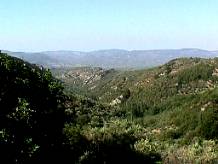 Just below us is the old stone road that follows the valley to the city of Mytilini. On the fifteenth of August, the day of the celebration of the Virgin Mary, or Panagia, this road will be full of people who will have walked from Mytilini and the villages in between. Agiassos is like Mecca. If it was not so difficult to leave the island after the Holy days, we would stay for the spectacle. Right now all the boats are arriving full and leaving empty. After the fifteenth it will be the other way around.
Just below us is the old stone road that follows the valley to the city of Mytilini. On the fifteenth of August, the day of the celebration of the Virgin Mary, or Panagia, this road will be full of people who will have walked from Mytilini and the villages in between. Agiassos is like Mecca. If it was not so difficult to leave the island after the Holy days, we would stay for the spectacle. Right now all the boats are arriving full and leaving empty. After the fifteenth it will be the other way around.